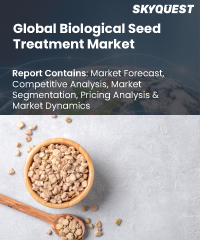
Report ID: SQMIG15C2042
SkyQuest Technology's Biological seed treatment market size, share and forecast Report is based on the analysis of market data and Industry trends impacting the global Biological Seed Treatment Market and the revenue of top companies operating in it. Market Size Data and Statistics are based on the comprehensive research by our Team of Analysts and Industry experts.
Global Biological Seed Treatment Market size was valued at USD 1.8 billion in 2023 and is poised to grow from USD 1.99 billion in 2024 to USD 4.53 billion by 2032, growing at a CAGR of 10.8% during the forecast period (2025-2032).
The global market for biological seed treatment is poised for substantial growth in the foreseeable future, primarily driven by the escalating demand for chemical-free crops. This surge in demand is attributed to shifting consumer preferences towards personal health improvement and the consumption of wholesome food. Additionally, the increasing elderly population is anticipated to further stimulate the demand for biological seed treatment. Notably, corn stands out as the primary crop benefiting from biological seed treatment applications in the United States. American farmers have recognized that employing selected biological seed treatment methods provides corn with a significant advantage during the germination period, leading to improved yields and contributing to sustainability in agriculture. By implementing precise combinations of microbial and fungal agents in biological seed treatments for corn, farmers have witnessed remarkable yield growth of up to ten percent.
The adoption of biological seed treatment in agricultural practices has witnessed significant growth due to its ability to prevent seed-borne and soil-borne infections and diseases. Compared to chemical treatments, biological seed treatment poses a lower risk of exceeding residue limits, aligning with the increasing demand for sustainable agriculture. Furthermore, the rising trend of organic farming is expected to have a direct impact on the market penetration of biological seed treatment products. According to the Office for National Statistics in the United Kingdom, the agriculture sector contributes approximately 0.7% to the country's total GDP. The composition of biological seed treatment products, consisting of naturally occurring active ingredients, offers plant protection against abiotic stress and soil-borne pathogens, consequently enhancing overall plant growth. However, the lack of awareness regarding sustainable agricultural practices in developing economies is projected to hinder market growth. Additionally, limited shelf life, particularly for seeds like soybean compared to other treated crop seeds, is expected to negatively impact demand over the forecast period. Biological seed treatment plays a crucial role in achieving sustainable agriculture by reducing the reliance on chemical fertilizers, boosting immunity, enhancing nutrient absorption capacity, and improving resistance to diseases and pest attacks. The reduced use of chemical fertilizers not only enhances crop health but also enables quick recovery from abiotic stressors such as drought and salinity.
REQUEST FOR SAMPLE
Biological Seed Treatment Market size was valued at USD 1.21 Billion in 2023 and is poised to grow from USD 1.33 Billion in 2024 to USD 2.88 Billion by 2032, growing at a CAGR of 10.1% during the forecast period (2025-2032).
The global biological seed treatment market is characterized by a diverse range of companies offering a variety of products. Market players focus on research and development activities to introduce innovative and effective biological seed treatment solutions. Strategic partnerships, collaborations, and mergers and acquisitions are common strategies employed by companies to enhance their market presence. Moreover, companies emphasize expanding their distribution networks and strengthening their relationships with farmers and agricultural organizations. Continuous technological advancements and product differentiation play a crucial role in maintaining a competitive edge in the market. 'BASF SE (Germany) ', 'Bayer (Germany) ', 'Corveta Agriscience (US) ', 'Novozymes A/S (Denmark) ', 'UPL (India) ', 'Koppert Biological Systems (Netherlands) ', 'Rizobacter (Argentina) ', 'Plant Health Care (UK) ', 'Italpollina (Italy) ', 'BiOWiSH Inc (US) ', 'IPL Biologicals (India) ', 'Kan Biosys (India) ', 'Advanced Biological Marketing Inc. (US) ', 'Bioworks Inc. (US) ', 'Germains Seed Technology (US) ', 'Nufarm Ltd (Australia) ', 'Lallemand inc. (Canada) ', 'Groundwork BioAg Ltd. (Israel)'
One key market trend in the global biological seed treatment industry is the growing adoption of organic farming practices. As consumers increasingly prioritize sustainable and environmentally friendly agricultural methods, there is a rising demand for biological seed treatment products. Organic farming regulations and certifications promote the use of natural and biological inputs, driving the market growth. Additionally, the emphasis on reducing chemical residues in food production and enhancing soil health further fuels the adoption of biological seed treatments as a preferred choice for farmers worldwide.
North America dominated the biological seed treatment market. In North America, the dominating segment is corn, as farmers in the US have recognized the significant advantages of employing biological seed treatments for corn crops. The accurate combination of microbial and fungal agents has led to remarkable yield growth of up to ten percent. The shift in consumer trends towards chemical-free crops and the emphasis on sustainable agriculture further contribute to the dominance of biological seed treatment in this region. The US market for biological seed treatment is characterized by extensive research and development activities, fostering innovation and the introduction of advanced products.
Want to customize this report? This report can be personalized according to your needs. Our analysts and industry experts will work directly with you to understand your requirements and provide you with customized data in a short amount of time. We offer $1000 worth of FREE customization at the time of purchase.
Feedback From Our Clients

Report ID: SQMIG15C2042
sales@skyquestt.com
USA +1 351-333-4748